By LOU HARRY
You don’t need to go to an amusement park to have the feeling of riding a roller coaster.
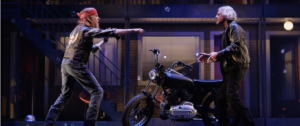
In Stratford, Ontario, you can acquire something akin to whiplash at a festival where you can see a brutal, biker-based Macbeth, an austere, and a spirit-lifting Annie in the same weekend with a garden stroll and some nice meals in between. (May I suggest Brch & Wyn for a between-show bite and sip?).
Those are just three of the shows on the Stratford Festival lineup this season and I caught them, along with a pair of others on a June jaunt there. Since this one-week Canada visit was partnered with a trip to the nearby Shaw Festival — more on that in another post — five was my limit.
Stratford Shakespeare productions often start with an added silent prologue and this Macbeth has a doozy likely to wake up both the Bard scholars and newbies in the audience. On a darkened stage, a small motorboard quietly glides on and we see that the person in the center has a sack covering their head. A cinder block is chained and the anonymous unfortunate is dumped overboard. Suddenly we’re seeing the view from underwater as the weighted-down body slowly sinks from above and, as it does, projected credits appear.
Yes, credits.
Welcome to the world director Robert Lepage and his conspirators have created to unfamiliarize us with one of Shakespeare’s most familiar works.
Lapage, whose credits include Cirque du Soleil’s Ka and Stratford’s equally brassy 2020 Coriolanus (streaming via subscription at http://www.Stratfestathome.ca), states in the director’s notes that “the director should not try to ‘modernize’ it but rather choose a context in which contemporary audiences can better grasp the twists and turnso the intrigue and the psychological complexity of the characters.”
One can argue whether motorcycles, barbecue, and roadside motels qualify as “modernizing,” but this context certainly gives new life to the piece. I don’t know much about biker culture, but the loyalty to leadership and rank seems plausable, the motel and mobile life atmosphere gives believable anchors the action, the acceptance of omens feels right, and the power-behind-the-power of Lady Macbeth is spot on. The ghostly effect were truly haunting, the weird sisters strikingly original, and scene transition from gas station killing to barbecue feast won’t soon be forgotten.
What was missing for me was the urgency of the narrative (moving a motel does tend to slow things down) and the gravitas of the story itself. There’s not a kingdom at stake, just a subculture with little impact outside its own bubble. The leads — aided considerably by the costume and hair crew — create memorable individuals. They have the walk, the talk and the attitudes down pat. Yet it never feels like the ambition of Tom McCamus’ Macbeth is driving him to his fate. He just seems to be along for the ride until he goes too far. An arc also seems missing from Lady Macbeth in spite of Stratford stalwart Lucy Peacock’s immersion in the character (Did anyone else sense a hint of Patti Scialfa?).
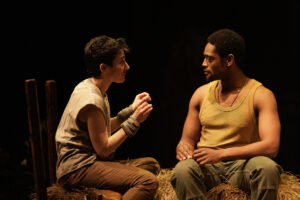
Across town at the Festival Theatre, what’s often labeled as a pastoral comedy opens in a totalitarian world with armed guards and very real threats to life and limb. There aren’t a whole lot of laughs in the first act of this As You Like It, but there is a very real sense of Rosalind and Orlando’s need to get out of Dodge ASAP.
Given the weight of the first act, it takes a while for Orlando’s tree-pinned poetry and Rosalind’s crossed-dressed efforts to educate him in the ways of love to feel truly romantic rather than trivial. That’s no fault of Sara Farb and Christopher Allen, both charming and grounded in the roles. It’s particularly nice to see an Orlando who doesn’t feel simply acted upon. They are well accompanied by Makambe K. Simamba, who gets shining moments in the second act as Celia, and Steve Ross as the clown Touchstone.
Even in the best productions, the rapid-fire repetance near the end can feel like a throw-away. Here, it’s rushed through as if the desire was for us not to even notice. And yet the climax, with its disclosures, reunions, and multiple marriages still has the power to be emotionally moving. Often a Stratford highlight, the music by composers Ron Sexsmith and Thomas Ryder Payne is beautifully woven throughout, making the joyful climactic dance so appealing that even the melencholy Jaques sticks around for it.
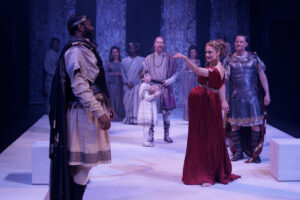
The Stratford’s most recent stage addition, the Tom Patterson Theatre, proved a less-than-ideal location for “The Winter’s Tale.” The runway-esque stage, with audience surrounding 80% of it, worked against the intense first act nor did help what should be an emotional wallop of an ending. Call it erring on the side of elegance. While “Macbeth” suffered a bit from too much stage magic, “The Winter’s Tale” suffered from too little.
That being said, the trio at the core of the first act deliver. Sara Topham’s presented a Hermione who undestands her own charms and truly loves the friendship between her husband and his best bud — which makes her spouse’s turnabout cut deeper. I had no trouble accepting the sudden freightening shift to jealousy of Graham Abbey’s Leontes or André Sills bewildered and hurt pal. Tom Rooney, who I’ve seen anchor other shows, took a backseat here as Camillo, but rang true throughout. And I would have happily followed Yanna McIntosh’s powerful Paulina into her own spin-off show. Unlike “Macbeth,” keeping the play in a royal context and heavily populating the stage gave its interpersonal drama heft. There’s not just relationships and individual lives at stake here but the fate of a pair of countries.
And then there were the musicals.
Stratford’s crisp production of “Dirty Rotten Scoundrels” made clear that the Jeffrey Lane/David Yazbek musical can survive quite nicely without the Broadway star power of Norbert Leo Butz and John Lithgow (I had my doubts after seeing a terrible non-Equity tour on its last legs years ago).
Packed with laugh-line lyrics, juicy supporting roles, and a fun, forward motion plot, “Scoundrels” is one of the better — at least, one of the most fun — movie-to-screen adaptations so far this century. It’s a boulevard comedy with little to think about except a having a good time. And the Stratford audience, which presented as largely unfamiliar with the source material, seemed surprised and delighted, embracing the minor nautiness and appreciating its joyful criminality.
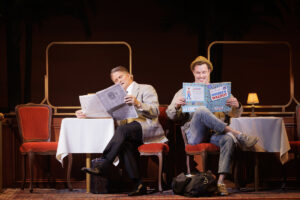
The leads (Jonathan Goad, Shakura Dickson, and, in the showiest role, Liam Tobin) all rise to the occassion. The surprise for me was how generous the show is to its secondary characters, offering fun turns from oil heiress Jolene Oakes (Michele Shuster), Chief-of-Police Andre (Derek Kwan) and on-the-prowl Muriel Eubanks (Sara-Jeanne Hosie). In a lesser production, the show would dip when the central trio are off stage. Thanks to these well-directed talents, that’s not the case here.
The show also serves as a reminder that David Yazbek, also responsible for music and lyrics for “The Band’s Visit,” “The Full Monty” and this Broadway season’s “Dead Outlaw,” is one of the best theater composers we’ve got. And that “Dirty Rotten Scoundrels” is an audience pleaser well-worth reviving. Just for the fun of it.
Finally, I’ll admit that I was less-than-thrilled when I saw that “Annie” was on the Stratford schedule this season.
“Annie”? Seriously? The leading theater festival in North America is going to trot out that warhorse?
One that has gotten multiple film and TV treatments, been staged ad naseum by high schools, community theaters, dinner theaters and more?
The one where just the thought of “Tomorrow” sends eyeballs rolling?
Yes, that one.
But I went. And I take it all back.
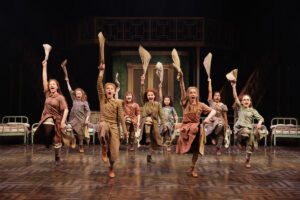
Statford’s production isn’t just the best version of Annie I’ve seen over the decades, it also reminded me that it’s a damn — or maybe I should say darn — terrific show.
Nothing radical has been done in director Donna Feore’s production. There’s no high-concept here, no revisionist thinking, no radical rethinking of casting. There’s no gimmicky star turn and no layer of cynicism imposed.
The thinking seems to be: Let’s pretend people don’t already know the material. Let’s act like they never heard “Tomorrow” or “Maybe” or “NYC.” Let’s forget its reputation as a warhorse. Instead, let’s embrace the fact that “Annie” is actually a great show loaded with a solid book, good jokes, motivated chacters, and a world-class Broadway song stack with tunes that fit naturally with the material.
Let’s cast it with triple threats — including every one of the personally popping orphans. Let’s bring the supporting and even non-named characters to life (Shout out to Drake, the butler). Let’s put on a show in which the audience really really really wants Daddy Warbucks and Annie to become father and daughter. And let’s wow them with dance.
And if, in the process, the timeliness of the show comes through as well, so be in.
Oh, and who cares if Warbucks has hair, if FDR has a cigarette holder, or if Sandy looks like the one on Broadway? This is our production. And we’re going to make the most of it.
I have just two minor complaints. First, I wish every big number didn’t end with an awkward freeze for applause. Trust us, we’ll applaud the good stuff even if your characters have moved on to other business until our reaction dies down. Second, using video projections when a balcony physically exists on the back while only makes the whole scene look distorted.
In short, though, I am thrilled that I resisted my cynicism and saw Stratford’s “Annie.”
Thanks to my smile, I was fully dressed from beginning to end.


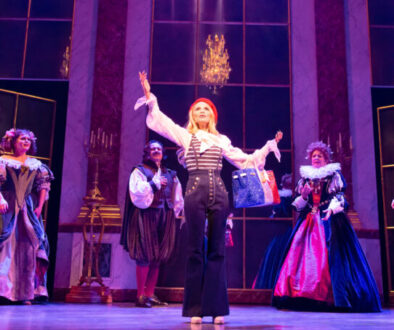
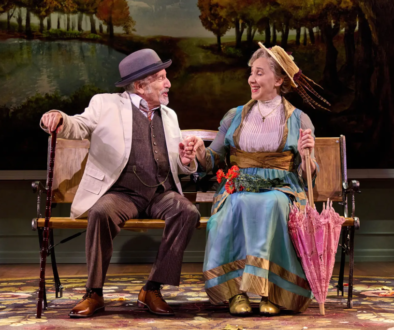
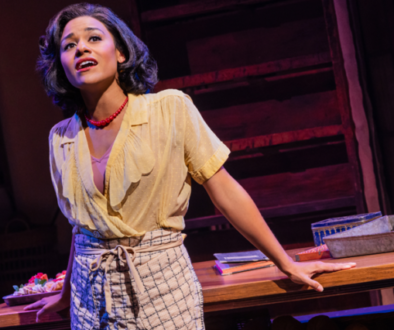
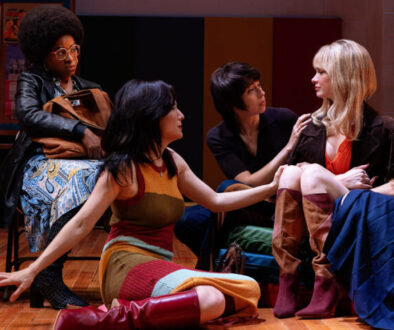
Shaw Festival offers repertory of plays, musicals - Theatre Criticism
July 14, 2025 @ 8:27 am
[…] a few days at the Stratford Festival, I stopped in at the Shaw Festival for the first time in a dozen years. Visiting the festival and […]